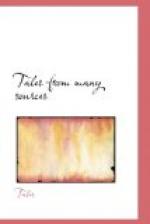The weather was warm. The little ladies were heated by discussion and the parson by vain scouring of the country on foot, when they asked his advice upon their project, and related their conversation with the lawyer. The two gentlemen had so little in common that the parson felt it his duty not to let his advice be prejudiced by this fact. For some moments he sat silent, then he began to walk about as if he were composing a sermon; then he stopped before the little ladies (who were sitting as stiffly on the sofa as if it were a pew) and spoke as if he were delivering one.
“If you ask me, dear ladies, whether it is your duty to provide for this child because you found him, I say that there is no such obligation. If you ask if I think it wise in your own interests, and hopeful as to the boy’s career, I am obliged to agree with your legal adviser. Vagabond ways are seldom cured in one generation, and I think it is quite probable that, after much trouble and anxiety spent upon him, he may go back to a wandering life. But, Miss Betty,” continued the parson in deepening tones, as he pounded his left palm with his right fist for want of a pulpit, “If you ask me whether I believe any child of any race is born incapable of improvement, and beyond benefit from the charities we owe to each other, I should deny my faith if I could say yes. I shall not, madam, confuse the end of your connection with him with the end of your training in him, even if he runs away, or fancy that I see the one because I see the other. I do not pretend to know how much evil he inherits from his forefathers as accurately as our graphic friend; but I do know that he has a Father whose image is also to be found in His children—not quite effaced in any of them—and whose care of this one will last when yours, madam, may seem to have been in vain.”
As the little ladies rushed forward and each shook a hand of the parson, he felt some compunction for his speech.
“I fear I am encouraging you in grave indiscretion,” said he. “But, indeed, my dear ladies, I am quite against your project, for you do not realize the anxieties and disappointments that are before you, I am sure. The child will give you infinite trouble. I think he will run away. And yet I cannot in good conscience say that I believe love’s labour must be lost. He may return to the woods and wilds; but I hope he will carry something with him.”
“Did the reverend gentleman mean Miss Betty’s teaspoons?” asked the lawyer, stroking his long chin, when he was told what the parson had said.
BABYHOOD.—PRETTY FLOWERS.—THE ROSE-COLOURED TULIPS.
The matter of the baby’s cap disturbed the little ladies. It seemed so like the beginning of a fulfilment of the lawyer’s croakings.
Miss Kitty had made it. She had never seen a baby without a cap before, and the sight was unusual if not indecent. But Miss Kitty was a quick needlewoman, and when the new cap was fairly tied over the thick crop of silky black hair, the baby looked so much less like Puck, and so much more like the rest of the baby world, that it was quite a relief.




